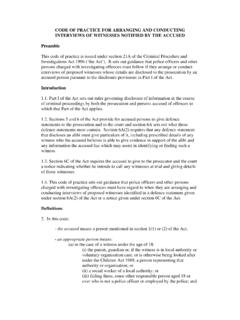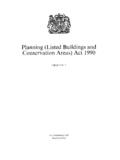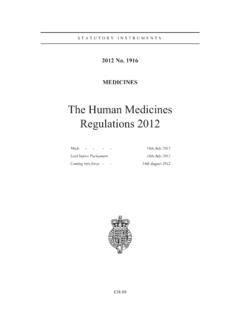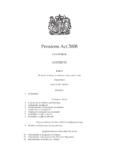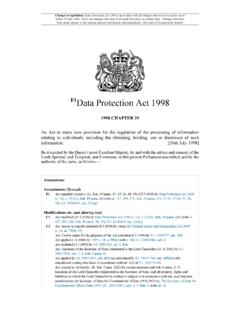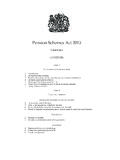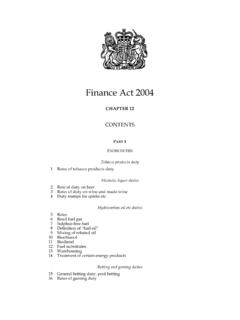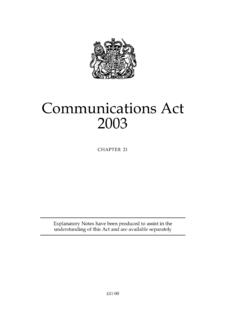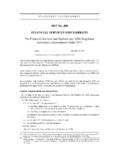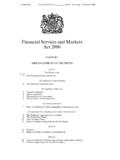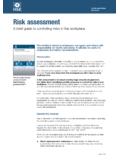Transcription of 2005 No. 1541 REGULATORY REFORM, ENGLAND AND …
1 STATUTORY INSTRUMENTS 2005 No. 1541 regulatory reform , ENGLAND AND WALES The REGULATORY reform ( fire Safety) Order 2005 Made - - - - 7th June 2005 Coming into force in accordance with article 1 ARRANGEMENT OF ARTICLES PART 1 , commencement and extent of responsible person of general fire precautions under this Order to premises of certain provisions PART 2 fire SAFETY to take general fire precautions assessment of prevention to be applied safety arrangements or reduction of risks from dangerous substances and fire detection routes and exits for serious and imminent danger and for danger areas emergency measures in respect of dangerous substances assistance of information to employees of information to employers and the self-employed from outside undertakings and co-ordination duties of employees at work to make regulations about fire precautions 2 PART 3 authorities of Order of inspectors on behalf of fire inspectors etc.
2 Of their powers by officers of fire brigades notices notices notices PART 4 OFFENCES AND of proving limits of what is practicable or reasonably practicable of disputes by Secretary of State PART 5 switches for luminous tube signs etc. of measures provided for protection of fire -fighters liability for breach of statutory duty not to charge employees for things done or provided to consult employees provisions in respect of licensed etc. premises of terms and conditions of licences dealing with same matters as this Order of byelaws dealing with same matters as this Order to consult enforcing authority before passing plans consultation by authorities of the Health and Safety at Work etc. Act 1974 in relation to general fire of notices etc. to the Crown and to the Houses of Parliament to visiting forces, etc.
3 Provisions , revocations, amendments and transitional provisions SCHEDULE 1 PART 1 MATTERS TO BE CONSIDERED IN RISK assessment IN RESPECT OF DANGEROUS SUBSTANCESPART 2 MATTERS TO BE TAKEN INTO PARTICULAR ACCOUNT IN RISK assessment IN RESPECT OF YOUNG PERSONSPART 3 PRINCIPLES OF PREVENTIONPART 4 MEASURES TO BE TAKEN IN RESPECT OF DANGEROUS SUBSTANCESSCHEDULE 2 AMENDMENTS OF PRIMARY LEGISLATION. SCHEDULE 3 AMENDMENTS OF SUBORDINATE LEGISLATION SCHEDULE 4 REPEALSSCHEDULE 5 REVOCATIONS 3 Whereas (a) the First Secretary of State ( the Secretary of State ) consulted(a) (i) such organisations as appeared to him to be representative of interests substantially affected by his proposals for this Order; (ii) the statutory bodies, and such organisations as appeared to him to be representative of those bodies, to whose functions his proposals relate; (iii) the Law Commission; (iv) the National Assembly for Wales; and (v) such other persons as he considered appropriate; (b) as a result of that consultation it appeared to the Secretary of State that it was appropriate to vary part of his proposals.
4 (c) following the consultation mentioned in recital (a) the Secretary of State considered it appropriate to proceed with the making of this Order; (d) a document containing the Secretary of State s proposals was laid before Parliament as required by section 6 of the REGULATORY reform Act 2001(b) and the period for Parliamentary consideration under section 8 of that Act expired; (e) the Secretary of State had regard to the representations made during that period and in particular to the 11th Report of the REGULATORY reform Committee of the House of Commons(c) and to the 27th Report of the Delegated Powers and REGULATORY reform Committee of the House of Lords(d);(f) a draft of this Order was laid before Parliament with a statement giving details of those representations and the changes to the Secretary of State s proposals in the light of them; (g) the draft was approved by resolution of each House of Parliament; (h) this Order modifies a function of the National Assembly for Wales and the Assembly has agreed that it be made; (i) the Secretary of State is of the opinion that this Order does not remove any necessary protection or prevent any person from continuing to exercise any right or freedom which he might reasonably expect to continue to exercise.
5 And (j) this Order creates burdens affecting persons in the carrying on of certain activities, and the Secretary of State is of the opinion that (i) the provisions of this Order, taken as a whole, strike a fair balance between the public interest and the interests of the persons affected by the burdens being created; and(ii) the extent to which this Order removes or reduces one or more burdens, or has other beneficial effects for persons affected by the burdens imposed by the existing law, makes it desirable for this Order to be made; Now therefore the First Secretary of State, in exercise of the powers conferred by section 1 of the REGULATORY reform Act 2001, hereby makes the following Order: (a) A consultation paper A consultation document on the reform of fire safety legislation was published by the Office of the Deputy Prime Minister in July 2002.
6 Copies may be obtained from the Office of the Deputy Prime Minister, Box 236, Wetherby, West Yorkshire, LS23 7NB. (b) 2001 c. 6. (c) Session 2003-04 HC 684. (d) Session 2003-04 HL 153. 4 PART 1 GENERALC itation, commencement and extent 1. (1) This Order may be cited as the REGULATORY reform ( fire Safety) Order 2005 and shall come into force in accordance with paragraphs (2) and (3). (2) This article and article 52(1)(a) shall come into force on the day after the day on which this Order is made. (3) The remaining provisions of this Order shall come into force on 1st April 2006. (4) This Order extends to ENGLAND and Wales only. Interpretation2. In this Order alterations notice has the meaning given by article 29; approved classification and labelling guide means the Approved Guide to the Classification and Labelling of Dangerous Substances and Dangerous Preparations (5th edition)(a) approved by the Health and Safety Commission on 16th April 2002; the CHIP Regulations means the Chemicals (Hazard Information and Packaging for Supply) Regulations 2002(b); child means a person who is not over compulsory school age, construed in accordance with section 8 of the Education Act 1996(c).
7 Dangerous substance means (a) a substance or preparation which meets the criteria in the approved classification and labelling guide for classification as a substance or preparation which is explosive, oxidising, extremely flammable, highly flammable or flammable, whether or not that substance or preparation is classified under the CHIP Regulations; (b) a substance or preparation which because of its physico-chemical or chemical properties and the way it is used or is present in or on premises creates a risk; and (c) any dust, whether in the form of solid particles or fibrous materials or otherwise, which can form an explosive mixture with air or an explosive atmosphere; domestic premises means premises occupied as a private dwelling (including any garden, yard, garage, outhouse, or other appurtenance of such premises which is not used in common by the occupants of more than one such dwelling); employee means a person who is or is treated as an employee for the purposes of the Health and Safety at Work etc.
8 Act 1974(d) and related expressions are to be construed accordingly; enforcement notice has the meaning given by article 30; enforcing authority has the meaning given by article 25; explosive atmosphere means a mixture, under atmospheric conditions, of air and one or more dangerous substances in the form of gases, vapours, mists or dusts in which, after ignition has occurred, combustion spreads to the entire unburned mixture; fire and rescue authority means a fire and rescue authority under the fire and Rescue Services Act 2004(e);(a) ISBN. 0-7176-2369-6. (b) 2002/1689. (c) 1996 c. 56; section 8 was amended by the Education Act 1997 (c. 44), section 52. (d) 1974 c. 37; the meaning of employee was extended by the Police (Health and Safety ) Act 1997 (c.)
9 42), section 1. (e) 2004 c. 21. 5 fire inspector means an inspector or assistant inspector appointed under section 28 of the fire and Rescue Services Act 2004; general fire precautions has the meaning given by article 4; hazard , in relation to a dangerous substance, means the physico-chemical or chemical property of that substance which has the potential to give rise to fire affecting the safety of a person, and references in this Order to hazardous are to be construed accordingly; inspector means an inspector appointed under article 26 or a fire inspector; licensing authority has the meaning given by article 42(3); normal ship-board activities include the repair of a ship, save repair when carried out in dry dock; owner means the person for the time being receiving the rackrent of the premises in connection with which the word is used, whether on his own account or as agent or trustee for another person, or who would so receive the rackrent if the premises were let at a rackrent; personal protective equipment means all equipment which is intended to be worn or held by a person in or on premises and which protects that person against one or more risks to his safety, and any addition or accessory designed to meet that objective; place of safety in relation to premises, means a safe area beyond the premises.
10 Premises includes any place and, in particular, includes (a) any workplace; (b) any vehicle, vessel, aircraft or hovercraft; (c) any installation on land (including the foreshore and other land intermittently covered by water), and any other installation (whether floating, or resting on the seabed or the subsoil thereof, or resting on other land covered with water or the subsoil thereof); and (d) any tent or movable structure; preparation means a mixture or solution of two or more substances; preventive and protective measures means the measures which have been identified by the responsible person in consequence of a risk assessment as the general fire precautions he needs to take to comply with the requirements and prohibitions imposed on him by or under this Order; prohibition notice has the meaning given by article 31; public road means a highway maintainable at public expense within the meaning of section 329 of the Highways Act 1980(a).
